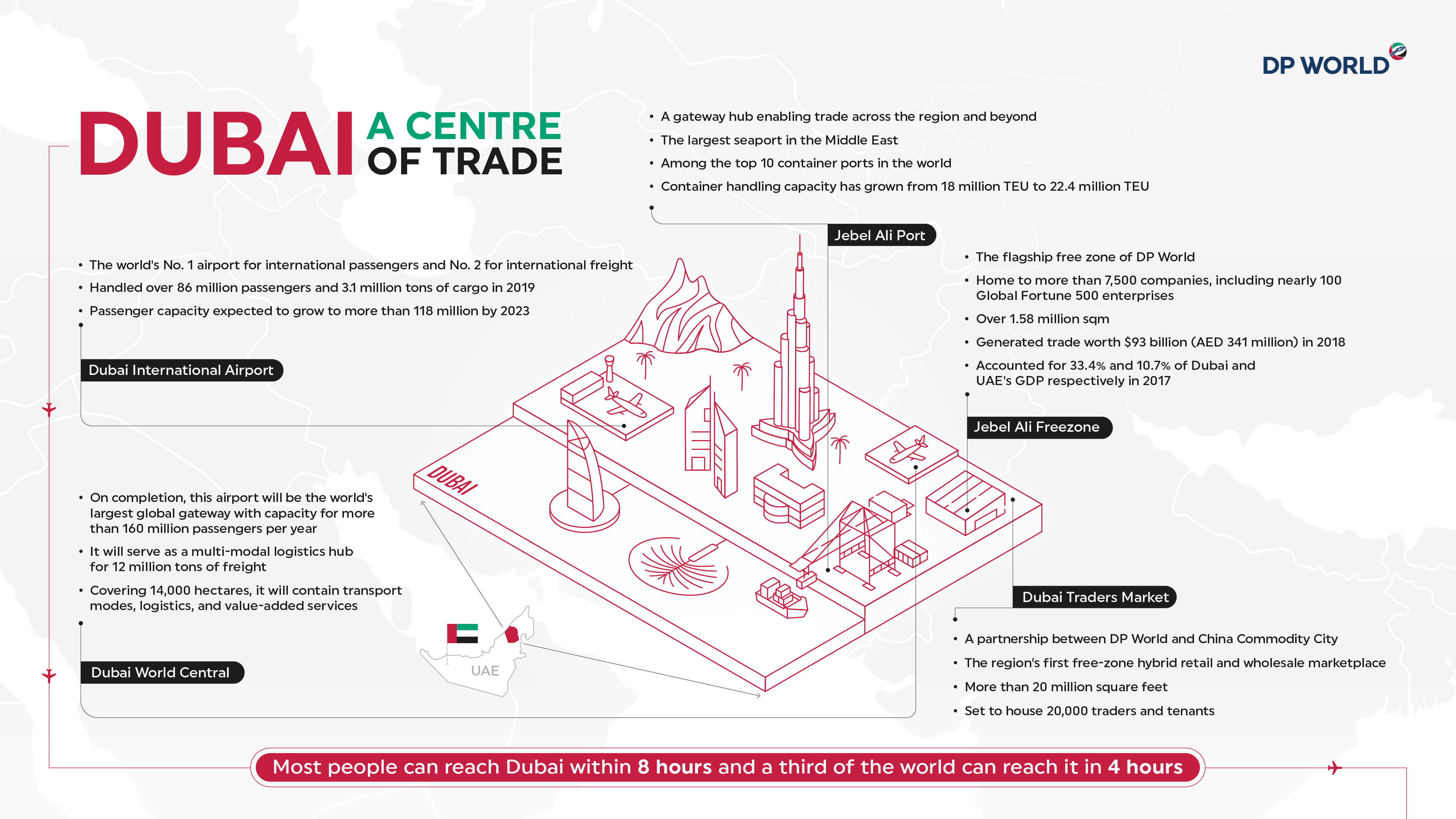Dubai: A leading global centre of trade
Articles
25 September 2024
An appetite for international collaboration and forward-thinking has propelled Dubai to the cutting edge of global industry.

The most successful centres of trade around the world have three things in common: great infrastructure, a business-friendly regulatory environment, and a history of innovation.
Recent years has seen Dubai elevated to this list of leading world trade centres. With more than three million residents, an impressive array of transport links and an ambitious growth agenda, Dubai has quickly earned its place as the major trading gateway where East meets West.
In March, Dubai Crown Prince Sheikh Hamdan announced that the Emirate’s non-oil foreign trade grew to AED 1.4 trillion in 2019, from AED 1.3 trillion a year earlier. Within 12 months, exports had soared from AED 127 billion in 2018 to AED 155 billion by the end of 2019.
Growth on this scale doesn’t happen by chance. Business take place where frictionless trade is enabled. That can be achieved by great transport links, through regulatory initiatives such as “free trade” ports or through the innovative use of technology.
A city of growth
While Dubai has always been a meeting place for traders, 60 years ago its centre was little more than a village. Visitors flocked because of its thriving pearling and fishing activities, but it was far from the global hub it is today.
Perfectly positioned, Dubai is in easy reach of the world. Most people can get there within eight hours and a third of the world can be there in half that time. This is only possible because the emirate boasts two modern airports with impressive supporting infrastructure.
In Dubai International, the emirate has the world’s number one airport by international passenger numbers and the world’s second largest in international freight terms. It is supported by Dubai World Central Al Maktoum International, which will eventually have an annual capacity of 12 million tonnes of freight and be able to handle in excess of 160 million passengers.
Dubai’s air links are supported by the Jebel Ali Port – the largest seaport in the Middle East and ranked among the top 10 container ports in the world. DP World has supported its flagship port to enable capacity growth from 18 million twenty-foot equivalent units (TEU) to 22.3 million in recent years. Like Dubai’s aviation hubs, the Jebel Ali Port is a key resource in supporting the flow of trade. It hosts more than 80 weekly shipping services and connects some 150 ports around the world.
Dubai Trader's Market
Of course, transport connections, alone, aren’t enough to encourage trade. In recent years, Dubai has worked hard to develop the Jebel Ali Free Zone – known to many simply as Jafza. Today, Jafza, is one of the world’s largest free zones, and it has been instrumental in boosting the economy of both Dubai and the UAE. From just 19 countries back in 1985, Jafza has grown in both size and significance. Today, it boasts more than 7,500 companies including around one fifth of the Global Fortune 500. In 2018, Jafza generated an impressive $93 billion in trade.
As you might anticipate from a trading centre of this size, there are companies from a broad range of sectors that have a presence in Jafza. Within the food and beverage production sector, for example there are 529 businesses from 67 countries. While some of these are local, 28 are British, 22 from the United States, 13 from France and seven from Germany.
The size and profile of Jafza means it makes an enormous contribution to the UAE as a whole. Through its network of businesses, production houses, storage units and berthed ships, the area contributes some 23.9% of the inward foreign direct investment to the country. It is also responsible for around 150,000 jobs across the UAE.
Having attracted the attention of the world’s largest businesses, Dubai is making even more ambitious plans for the future. The new Dubai Trader's Market located in Jafza – announced earlier this year – is likely to enhance Dubai’s reputation for trade still further.
Comprising an area of more than 20 million square feet, and located opposite Expo Dubai, the Dubai Trader's Market will permit 100% foreign ownership and 100% foreign repatriation of capital and profits, with no restrictions on worker numbers. Once fully operational, it will house showrooms, retail premises, warehousing, offices, hotels and residential units.
With an ever-increasing thirst for innovation and an ambitious vision for the future, Dubai is fast becoming the standout world leader in international trade. Its ongoing appetite for international collaboration and a forward-thinking approach to business will surely solidify its reputation as being at the cutting edge of global industry.

Get in touch with us for commercial enquiries











